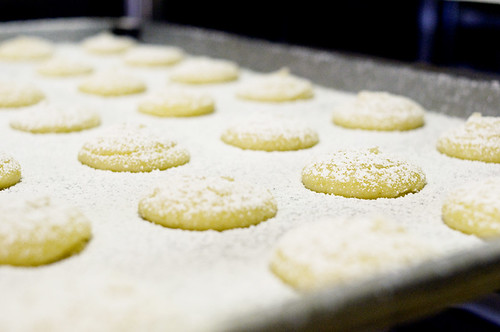
Aromas of yeast, milk, sugar, butter, eggs, flour and cinnamon emanate from La Mejor Bakery on 24th and Bartlett streets. The alluring smell fills the adjacent sidewalks. The display of Mexican sweet bread attracts commuters waiting for the 48 bus line, and people rushing down the BART station’s escalators on the Mission Street detour to grab a piece.
La Mejor, a family-owned business established in the Mission district in 1999, produces approximately 107 pounds of bread every each day. But this year, the rising cost of flour, butter and sugar has forced the bakery to raise prices of each piece of sweet bread by 5 cents, slowing sales since Feb. 1, according to employee Gonzalo Morales, 37.
“The fundamental problem with food commodities has been supply disruptions,” wrote SF State economics lecturer Larry Shotwell in an e-mail. “Australia has had floods that have reduced crop production, Russia has had poor crop output and a number of other producing countries have had similar (situations).”
As supply disruptions force countries to reduce their crop exports and the demand for crops continues to grow, the prices of sugar, flour and other foods will rise, Shotwell said.
Four months ago, a 50-pound bag of flour cost La Mejor Bakery $14. Today, it costs $18.50 for each of the 15 bags of flour it uses weekly, said co-owner of the shop Rigo Calzada, 30.
Calzada said the rising cost of flour means less profit at the end of the day.
“Sales will be slow until people become accustomed to the new prices, and it doesn’t take too long,” Morales said in Spanish. “People will sacrifice their expenses in anything else but sweet bread.”
Mission district resident Maria Ramirez, 42, agrees with Morales.
She said 11 people live in her house and Mexican sweet bread is a staple in her household’s diet.
“Now I walk up and down the street asking how much the bread costs before I decide where to buy,” Ramirez said. “We eat pan dulce for breakfast and at night with a cup of coffee. I have to get enough bread for everyone.”
According to an article published by the CBS Interactive Business Network in 1991, American consumer spending on bakery products topped $50 billion in 1990, a growth triggered by interest in healthy eating and convenience.
Consumers today are ingesting more fiber, bran and whole grains while at the same time, buying more highly processed foods such as sandwiches, pizzas and tortillas – which often contain large amounts of flour, the CBS article said.
Despite the higher commodity prices, both Calzada and Morales are determined to make the best of the situation.
“As the price of our main ingredients go up, we have to take advantage of our convenient location by opening earlier and providing our customers with a greater variety of pastries,” Calzada said.
The bakery now opens at 5:30 a.m., 30 minutes before its usual time, and serves fresh-out-of-the-oven French rolls that are topped with sesame seeds and filled with cream cheese and jalapenos.
“People like them because they grab one for breakfast on their way to work and another for lunch,” Morales said.
The bakery’s newest creation is pastel de cuatro leches. It consists of table cream, and evaporated, regular, sweetened and condensed milks to provide moistness and sweetness to the cake.
“It has been a hit and we’re the only ones in the neighborhood who have it,” Morales said while working on a pastel de cuatro leches for a quinceañera.
The rising cost of commodities in San Francisco is not uncommon to the rest of the world.
According to “Commodity Costs Pressure Provincial Firms,” an article by Rebecca Penty published in the New Brunswick Business Journal March 5, 2011, rising food prices across the globe were part of the reason people protested in North Africa, which saw the overthrow of autocratic leaders in Tunisia and Egypt.
The journal further said the protests triggered tensions in the Middle East, which in turn pushed up oil prices.
“When gas prices increase, the cost of food is affected,” Calzada said. “Shipment prices increase because distributors need to make a profit as well.”
However, Shotwell believes higher gas prices have not fully had its effect on increasing food commodity prices yet.
“Higher gasoline prices are a recent event but they will have a marginally adverse impact on food and crop production, and it is certainly needed to transport the crops,” he said. “So gasoline will add to the food price increases.”






